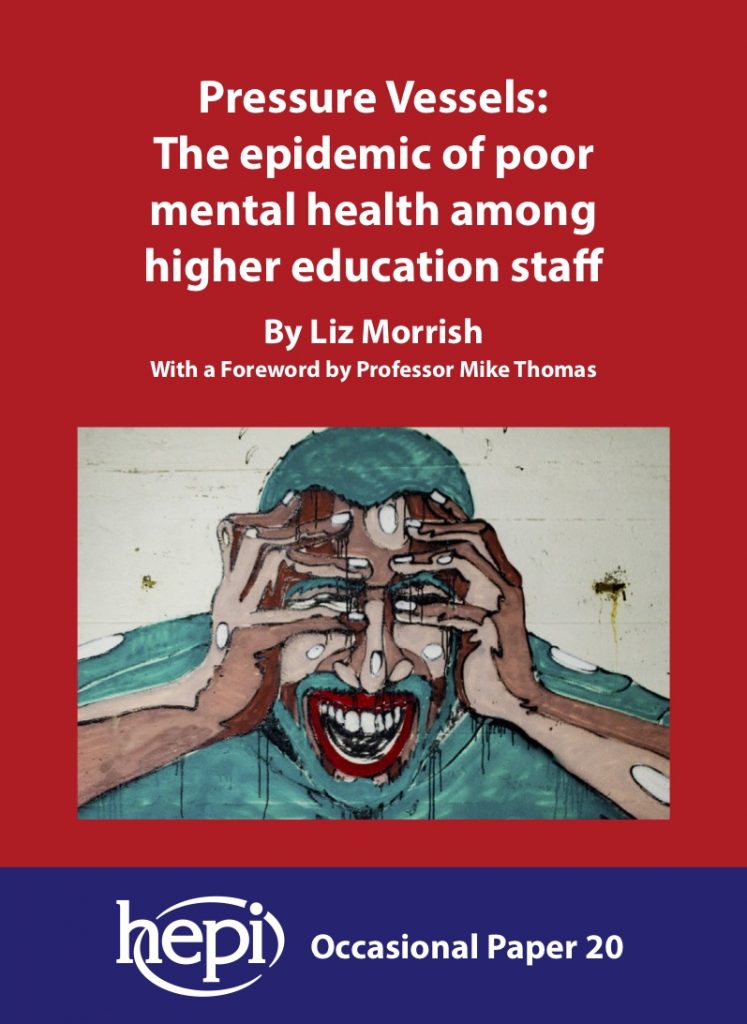Big increase in demand for #MentalHealth support among higher education staff

A new Occasional Paper from the Higher Education Policy Institute reveals a big increase in the number of university staff accessing counselling and occupational health services.
Pressure Vessels: The epidemic of poor mental health among higher education staff, HEPI Occasional Paper 20, by Dr Liz Morrish includes new data obtained from 59 universities via Freedom of Information requests.
The numbers show managers are referring far more staff to counselling and occupational health, at one institution, the increase in referrals to occupational health since 2009 was 424%; and another university recorded a rise in referrals to counselling of over 300% in the same period.
The report argues three factors are behind the increases:
- New workload models;
- More directive approaches to performance management; and
- Short-term contracts, which provide less security.
Liz Morrish, the author of the report, said:
In academic life, there are no peaks and troughs of work anymore as the pace continues relentlessly throughout the year.
As university fees have risen in England and Wales, the pressure to satisfy increasing student expectations has fallen on teaching staff. Managers have increased their demands on the academic workforce over concern about university rankings and league tables. At the same time, repeated research and teaching audits have created a culture of workplace surveillance.
Academics are inherently vulnerable to overwork and self-criticism, but the sources of stress have now multiplied to the point that many are at breaking point. It is essential to take steps now to make universities more humane and rewarding workplaces which allow talented individuals to survive and thrive.”
The report discusses instances of good practice and proposes solutions which university managers can implement to ease the toll on staff, including:
- not scheduling workloads ‘up to the max’ in order to allow necessary time for scholarly contemplation and experimentation;
- introducing more reasonable expectations of staff; and
- ensuring career pathways that offer opportunities for development, with security of employment.
In a Foreword to the report, Professor Mike Thomas, the former Vice-Chancellor of the University of Central Lancashire (UCLan), says:
It is not all negative, and there are some good initiatives happening in the sector. The increasing interest in Stewardship as a leadership approach, with its emphasis on maintaining a high-trust environment and appreciating colleagues’ knowledge and values, appears to be attractive to staff.
Collaborative leadership seems to provide hope and optimism with a positive impact on staff mental health. More work can be done to disseminate the efforts which some universities have already commenced, such as reforming structures, working conditions and career progression.
Supporting collaboration, rather than competition, between universities also seems to be welcomed by colleagues and university leaders need to encourage initiatives in this area.”
Nick Hillman, the Director of HEPI, said:
It is time to shine a spotlight on the mental health of staff just as we have already shone a light on the mental health of students.
There are challenges in discussing the issue because a big increase in the number of staff making use of support services may reflect improved access to support, which is welcome, as well as a greater incidence of mental ill-health.
Nonetheless, it is right that we consider this whole topic from every vantage point. I am struck, in particular, by the need to think about the whole experience of being a member of staff in higher education, just as we now talk of the broader student experience. When considering staff, we must not focus only on pay and pensions, despite their importance, but also be more open about issues like mental health.”
Liz Morrish is an independent scholar and Visiting Fellow at York St John University who researches the effects of managerialism in universities. She writes about the discourse of managerialism in higher education, and is completing a co-authored book on this topic, entitled Academic Irregularities(Routledge, forthcoming).
This work builds on earlier work by HEPI on the issues of well-being and mental health in higher education, including: Measuring well-being in higher education by Rachel Hewitt (Policy Note 13, May 2019); The Positive and Mindful University by Anthony Seldon and Alan Martin (Occasional Paper 18, September 2017); and The invisible problem? Improving students’ mental health by Poppy Brown (Report 88, September 2016).











Responses